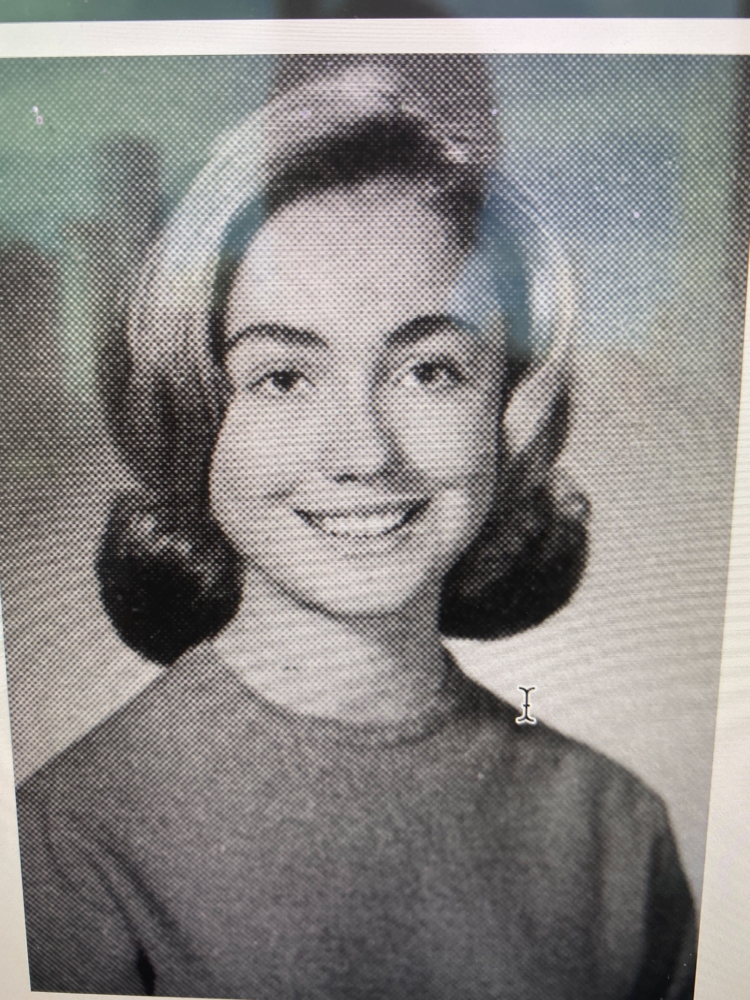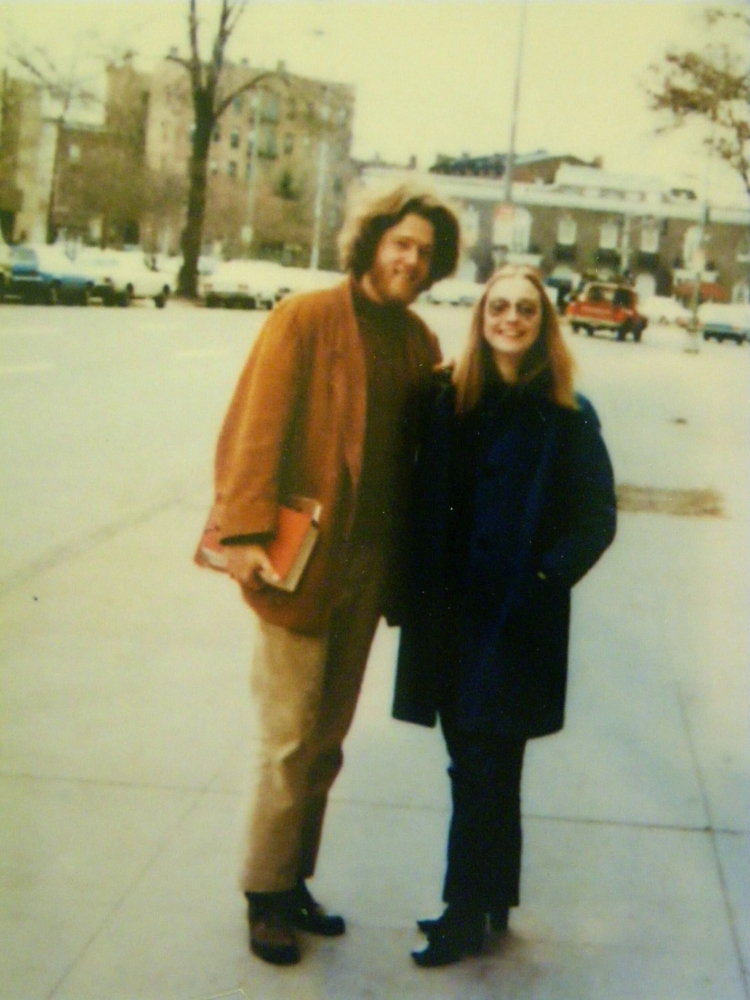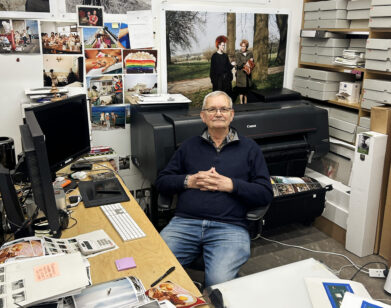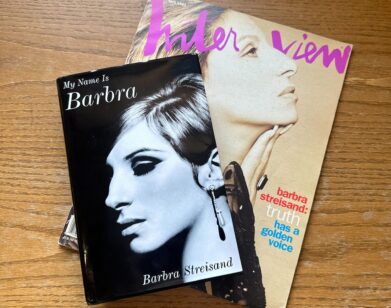Curtis Sittenfeld and Judy Blume Discuss Hillary Clinton’s Life Without Bill
Hillary Clinton towers above American culture like a pant-suited Colossus of Rhodes. She is one of the most loved and hated, most admired and maligned, figures in contemporary politics—little wonder, since most adults in the nation not only remember her fraught tenure as first lady in the 1990s, but also cast a vote for or against her in 2016 in her turbulent candidacy for president. We all have an opinion about Hillary Clinton. It would seem that every facet of her existence—from her marriage to her law career to the tone of her voice to her hair—has been analyzed, criticized, politicized, demonized, and celebrated.
But what if?
In her new novel, Rodham, Curtis Sittenfeld plays one of the most fascinating “choose your own adventure” games in literary history. What if Hillary never accepted William Jefferson Clinton’s proposal of marriage, breaking the time-space continuum that would lead her to Washington by Bill’s side for all the scandals, adulteries, investigations, and testimonies that shadowed her public existence. This isn’t the first time the 45-year-old author has tackled the fictional biography of a first lady (2008’s American Wife was a veiled account of the life of Laura Bush), but Rodham bravely and breathlessly takes this speculative fiction into the territory of what could happen when a brilliant, ambitious young woman is unshackled from her brilliant, ambitious, highly flawed husband.
Sittenfeld has been a lifelong fan of the national literary treasure Judy Blume. In recent years, they have become friends. During this age of isolation, Blume (in Key West, Florida, where she lives with her husband and has founded a bookstore) and Sittenfeld (in Minneapolis, with her husband and children) discussed the enduring power of Hillary, the magnetism of Bill, why sex needs to be written about, and why a fictional history of Melania doesn’t seem likely.
———
CURTIS SITTENFELD: Hi Judy. How is your bookstore [Books&BooksKW] holding up? Are you able to get books out to customers?
JUDY BLUME: Obviously we’re physically closed, but we’re open for online and phone orders. We are delivering right to people’s doors if they live in Key West. Order by noon, get your book by 4.
SITTENFELD: That’s amazing.
BLUME: We’ll do anything we can. We need to keep it going. Talk about a really crazy time. It’s terrible. In my lifetime, there’s never been anything like this. And I’m very old now, Curtis. George [Blume’s husband] and I are both 82.
SITTENFELD: I think of you both as being very youthful.
BLUME: So do I but George was sick last year, as you know, although he is very strong. He was diagnosed with pancreatic cancer, and he had to go through surgery and chemotherapy. But he is amazing. He doesn’t have the anxieties that I have. He just got through the whole thing, and now he’s out there walking and biking. He says he’s never been in such good shape.
SITTENFELD: Maybe it’s for the best if there’s a designated anxious person within a couple.
BLUME: Which one are you?
SITTENFELD: Which would be your hunch? If I’m the writer and my husband’s not a writer, which one of us do you think is the anxious one?
BLUME: My hunch is that you’re like me.
SITTENFELD: Yes, of course. I aspire to be like you, but yeah, I am definitely the anxious one.
BLUME: High anxiety, high imagination.
SITTENFELD: Do you think those things are linked, or just a stereotype of writers?
BLUME: I wouldn’t say writers in general, but maybe fiction writers. What do you think?
SITTENFELD: I do find it to be anecdotally true. I think I’m very neurotic for a normal person, but actually very well adjusted for a writer. But maybe I’m delusional. If I’m interacting with my typical suburban neighbors, something eccentric might pop out of my mouth, but it’s nothing compared to the eccentric thing that would pop out of another writer’s mouth five minutes after we met at some event.
BLUME: We both raised kids outside of New York, where all the writers are, so we had to be regular people, too.
SITTENFELD: Do you think that’s served your writing?
BLUME: Probably. Right now, looking at what people are doing today at home, being isolated with kids, and no helpers in the house, I’m thinking, “How did I ever do that, the young me, kids and household duties and still writing?” And yet, I also think I got more writing done in those days because I used my time really wisely. I had those two hours a day when they went to preschool. That’s just what we got then.
SITTENFELD: The preschool years especially! I would sometimes encounter other moms who had clearly spent the entire preschool time exercising or running errands. And I would be like, “I’m trying to fit a book into this hour!”
BLUME: Let me start this interview by telling you that you are my second interview. The first person I interviewed professionally was Hillary Clinton.
SITTENFELD: Oh my god. Wait. What? When? Where?
BLUME. It was the 25th anniversary of Sesame Street [in 1993]. TV Guide came to me and said, “Would you interview Hillary Clinton? She’s coming for the 25th anniversary.” I was totally unprepared and inadequate. It’s just not what I can do. George took a photo of me that morning before the interview. I was wearing a power jacket with big shoulder pads, and I had big permed hair that went all the way down to my shoulders. He got me a little tape recorder. I told Hillary, “I’m really nervous, I’ve never interviewed anybody, let alone a first lady. She said, “Don’t worry. Just turn on your tape recorder and I will talk.” She was well prepared. She even told me Chelsea’s favorite Muppet. Snuffleupagus. There was nothing spontaneous. It was very fast. Did you ever interview her?
SITTENFELD: No, but I have been in relatively close physical proximity to her. When I was a senior at Stanford, Chelsea toured. I think Chelsea is five years younger than I am and was a junior or senior in high school. This was probably the fall of 1996. None of us had cellphones, but the campus grapevine came to life, and people said, “Chelsea and Hillary are on a tour at this very moment.” I was on the staff of the newspaper. We staged a meeting outside, knowing that the natural path of the tour would make them cross by us. So I stood a few feet away from her, but I’ve never shaken her hand. I’ve never met her. I don’t anticipate that I will.
BLUME: I’ve met her several times on the Vineyard [Martha’s Vineyard] in the summer when there would be fundraisers—Come and meet Bill and Hillary at so-and-so’s house. It would be a big get-together for the Democratic Party. Chelsea was always there. I did shake her hand. Then you stand on line and have your picture taken with them. That always struck me as so bizarre. But that’s politics, right?
SITTENFELD: Did you have a different impression of her during those fundraisers than you did during your Sesame Street interview?
BLUME: I always asked her about Chelsea. She liked that. I think that was really important to her, although that’s not why I asked. I asked because I was always interested in what was it like being her kid.
SITTENFELD: It is interesting. What about Bill?
BLUME: Bill was the way you captured him in your book. He looked right in your eyes. My daughter was with me once. She had some kind of tank top on. She said, “Oh mother, he put his hand right on my bare back.” He put his arm around whoever was standing next to him. He has that big hand, and it was on her bare back. Maybe she had tingles. I don’t know.
SITTENFELD: I’ve never met him, but I have heard many times that he has this incredibly magnetic presence, and that even people who plan not to like him swoon a little bit when they’re actually confronted with his magnetism.
BLUME: Even with all those hundreds of people there, he has that ability to make you feel, if only for half a minute, that you are the only one. Before I ever met him, a friend of mine had told me that. But let’s get on to your novel. First, I have to tell you, I’m a huge fan of your work. Ever since my daughter introduced me to Prep [2005], I’ve been hooked. American Wife [2008] is a real favorite. I hand-sell it every day at the bookstore. And now this new one—I could not put it down! I was riveted, in part because I love you and I love your work, but also because I was really, really curious. I couldn’t stop reading.
SITTENFELD: Yay!
BLUME: So, first ladies, wives of presidents, whatever you want to call them—when and how did you decide to write Hillary’s alternative life story, where she doesn’t marry Bill?
SITTENFELD: There are two answers. In early 2016, before the election, an editor at Esquire reached out and asked if I would like to write a story from Hillary’s perspective around the time of her becoming the official Democratic Party nominee. I did it, but it was a straightforward story. It never said her name, but it’s very clear who it is. It’s in the first-person. That fell in my lap and wasn’t even my idea. Then when the election occurred, like a lot of people, I was surprised and disturbed by how things unfolded. I started to have this realization that grade-school children were aware of Hillary running for president, but a lot of them literally didn’t know that Bill Clinton existed, let alone that he had been president, let alone that there’s all this baggage associated with him for a lot of American adults. I thought to myself, “What if nobody thought of Bill and Hillary in the same breath? How would her life and career have played out differently?” I don’t think I could have written a straightforward recounting of the 2016 election, even a fictional one. It would just be too painful. But I did feel like I could come at it sideways.
BLUME: As a writer, it’s hard enough to write about fictional lives. But is there added pressure when it comes to tackling someone who is as well-known as Hillary?
SITTENFELD: Yes and no. You know the thing you said about how we’ve both lived a lot of our adult lives not in a literary epicenter? When I’m writing a book, it’s almost like I’m in a little cave by myself, trying things. I can always say to myself, “It’s a little weird that I’m writing this, but I don’t have to put it out into the world,” or, “This is just an experiment and I’ll see how it turns out.” I give myself freedom in that way. Then, if I don’t feel like it’s good enough, I can just hide it and nobody ever knows. This is my seventh book. I think it would have been nerve-racking if it were my first book. There are criticisms that a person can make of this book that are legitimate, but I think there are criticisms that a person can make of any book that are legitimate.
BLUME: I can always write the bad reviews of my books myself, imagining the worst that someone could write about a book I’ve written.
SITTENFELD: I know what the negative reviews will say before I read them.
BLUME: I only see positives in this book. I was so mesmerized by the early love story of Hillary and Bill that I was actually rooting for them. When one or the other behaved in the wrong way, I was like, “No, no, no! Don’t do that!” I have to ask you about the sex scenes, because you and I both have written about sex and it’s no big deal. Here, they’re explicit but they’re delicate, and all from Hillary’s point of view.
SITTENFELD: I have to say, really and truly, everything I know about writing about sex I learned from Judy Blume. Really. It’s actually fascinating to me to hear you say, “We both write about sex and it’s no big deal.” Why is it such a big deal to other people? Do you feel like you’ve spent a lot of time answering the question of why you include sex?
BLUME: Maybe long ago. With Forever [1975] or even Margaret [Are You There God, It’s Me Margaret?, 1970]. Margaret used to be banned.
SITTENFELD: In the future, whenever anyone asks me, I want be like, “As Judy said, it’s no big deal.”
BLUME: It’s a part of life. It is an important part of life. I’m saying that as an 82-year old. It is who we are. I will bet you that there are millions of people who won’t admit it, but who have imagined sex between Hillary and Bill. You have imagined them very delicately yet realistically. How was it writing those scenes?
SITTENFELD: It basically took me three years to write this book. Early on, there were decisions I had to make as a writer where I thought, “Am I going to use real names? Yes. Am I going to include sex scenes? Yes. Are they going to be pretty specific? Yes.” After that, the decision felt resolved. I didn’t show the book to anybody for let’s say two-and-a-half years. Then, when other people read it, they have to go through the same thing of like, “Wait, did she use their real names? Wait, did she include sex scenes?” I feel like there are reasons, which I think that you and I probably intuitively understand, to depict a character in all their complexity. Of course you include sex. To show that this is such an important relationship and that it feels different to her. It almost seems like something would be missing or unexplained if it wasn’t there. I don’t think that it’s deliberately provocative, although there are things I’ll do as a writer that will make me feel embarrassed or sheepish as a person. If one of my neighbors said, “I read that scene of Hillary and Bill,” I might blush, even though as a writer, I would totally defend why it belongs in the book.
BLUME: I don’t see how you could tell this story without it, because so many of her major decisions are because of who he is sexually.
SITTENFELD: It does seem very intertwined with his general magnetism.
BLUME: It was refreshing for me to think of her as a sexual being, which I never really did before. Not that we’re saying she is. We’re just saying that she is in this fictional story, and I like that.
SITTENFELD: I think that distinction is important. If somebody said, “I really want to know who Hillary Clinton is,” I would not say, “You should read my book.” You should probably read a biography or one of her memoirs.
BLUME: What did you do in terms of research?
SITTENFELD: I did a fair amount. When I wrote American Wife, I had read [Clinton’s] memoir called Living History. Then I read her 2017 memoir. I read Bill’s autobiography up until they got married and then, because my plotline diverged from history, I stopped reading. There’s a Carl Bernstein biography of Hillary [A Woman in Charge] that I read. There’s a very juicy book called Chasing Hillary by Amy Chozick, who covered Hillary’s political career on and off for 10 years. Then I listened to the audio of the memoirs of the women senators who ran for president in 2020, like Amy Klobuchar and Elizabeth Warren.
BLUME: Your writing is often very funny. In this book, writing in Hillary’s voice, did you find yourself having to hold your humor in check?
SITTENFELD: Do you think there’s humor in the book?
BLUME: When you bring in Donald Trump as a character late in the book, I laughed out loud. Otherwise, I don’t think it’s funny. Do you think it’s funny?
SITTENFELD: Humor is really hard for me to assess. Sometimes I’ll write something I didn’t intend to be funny and then people will think it’s funny. Or vice versa. I also feel like life is often funny, so it’s almost like if you’re depicting life realistically, humor will arise. The way I perceive Hillary is that she does have a sarcastic streak. I think she’s actually a very warm person, which I am not sure is a widely held view, but among the people who know her, it seems like she’s a warm person.
BLUME: People who know her tell me she has a great sense of humor.
SITTENFELD: She has received so much conflicting, impossible advice about how she’s supposed to act over the years: Be tough, but be warm, but be authoritative, but be empathic, but don’t seem weak. I think that she’s pretty publicly guarded in a way that is understandable, given that she came of age in very male-dominated fields.
BLUME: I think she’s really wary, and with good reason. Did you ever feel like you wanted to break out of the scene, call her up, and say, “Answer this question for me”?
SITTENFELD: When I wrote American Wife, I would sometimes dream of Laura Bush at night. I now dream of Hillary Clinton. In the dream I feel a little bit like, “I admire you, and my admiration is a large part of what motivated me to write this book, but I understand that you might have mixed feelings about the book if you read it, which I think you probably won’t do anyway.” If someone reached out and said, “Hillary Clinton would like to talk to you,” I would be excited. In terms of whether or not there anything really mysterious, I feel like that’s what fiction is for. You get to solve the mystery the way you want to solve it. I don’t think there’s any piece of information that I really wanted to get my hands on. I wrote the book I wanted to write, and I cannot control the real Hillary’s reaction to it.
BLUME: Of course.
SITTENFELD: Occasionally Laura Bush would be asked if she’d read American Wife, and she would say, “No, I lived it.”
BLUME: Here’s the thing: American Wife is sympathetic to the fictional Laura Bush. And I didn’t know much about Laura Bush before I read it. We’ve all had so much more Hillary than Laura. Rodham is equally sympathetic to Hillary. She surely makes mistakes in the book, especially when it comes to reading people. Sometimes I wanted to shake her and say, “Don’t do that! Stop! What are you doing that for?”
SITTENFELD: I would not want her to be morally exemplar. She’s an admirable person on the whole, but I wouldn’t want her to be perfect, because I think that would make her almost robotic. Humans are human in part because of our mistakes and bad judgment.
BLUME: I’m an intuitive writer, so I’m sometimes surprised by what my characters do.
SITTENFELD: But don’t you like being surprised?
BLUME: Oh, yeah. It’s the best part. Okay, I mentioned that Donald Trump appears in the book. Let me ask, do you think you could ever write about Melania from her point of view, or have you had it with the wives of presidents?
SITTENFELD: I would never say never about Wives of Presidents as a category. I do not anticipate that I will ever write from the point of view of Melania, partly because of what you’re saying about my depiction of Laura Bush or my depiction of Hillary—that they’re essentially sympathetic. I feel much less sympathy for Melania. I wouldn’t choose to try to get inside her head. That’s just not how I would choose to spend my time.











